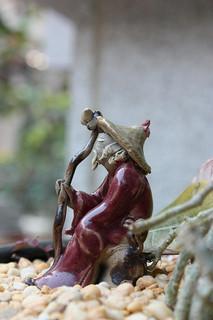
Photo by Wunkai.
Like many, I have an interest in the spiritual development of older adults. I hope to achieve greater spiritual development for myself as I age. I also wish for older adults the comforts of spiritual insight as a way to manage late-life challenges.Blogging about this topic, however, proves problematic.
Spirituality a very rich subject involving many religious traditions (Judaism, Christianity, Buddhism, Islam, etc), overlapping concepts (such as religion and spirituality; emotion and spirit; thinking and feeling; wisdom and intelligence, etc.) and several fields (theology, psychology, sociology, etc.).
In an effort to address this topic in manageable portions, I plan on writing one post a month on the topic. Today, I want to share the work of psychologist Robert G. Peck.
I have long found Erik Erikson's stage theory a bit anemic when describing midlife and late adulthood. I recently learned that Peck thought so, too; hence he expanded the model to describe these tasks for those in midlife and late life:
- valuing wisdom vs. valuing physical power
- mental flexibility vs. mental rigidity
- ego differentiation vs. work role preoccupation
- body transcendence vs. body preoccupation
- ego transcendence vs. ego preoccupation
An example of someone who is "stuck" in the right-hand side would be Willy Loman, the main character in the play Death of a Salesman. He is still trying to function as the young, charming sales man who succeeds at work and with the ladies based on his charm. He also tries to act the hero to his growing sons, who are starting to see the chinks in his armor. As Loman ages, he tries to rely on his tried-and-true tricks of the trade. Instead of adjusting to his changing social status, he despairs and even becomes suicidal.
Imagine a person who demonstrates the traits on the left. She would accept changes to her body but still work to be healthy and strong. She would be a life-long student who develops new skills and interests in midlife and beyond. She adapts, recognizing that she probably cannot hold the same social roles at 80 as she did at 20.
Some people have a difficult time adjusting to age. I believe this is true for a number of reasons.
- We as a society don't live in multi-generational communities, so we don't observe older adults develop.
- We live in a youth-obsessed culture where physical beauty, physical strength, power and fame are revered.
- We are still trying to develop religious practices to support new views of spirituality that replace dogmatic, overly authoritative religious traditions that many of us dismissed as young adults.
Perhaps as the Baby Boomers move into late adulthood, they will help articulate their path to spiritual enlightenment so that others might follow and not despair when faced with late-life challenges. I expect them to do this! The Boomers have certainly done much to redefine and articulate their journey through every preceding life stage.
Related:
Spirituality and Older Adults: Ask, Don't Tell

